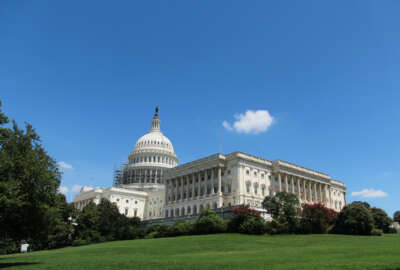Analysis: Feds have plenty to focus on with omnibus, defense bill unresolved
Jim McAleese, defense analyst and principal of McAleese and Associates, anticipates some last minute maneuvering from Congress to secure funding for 2012.
wfedstaff | June 4, 2015 3:07 pm
By Michael O’Connell
@moconnellWFED
hedWeb Editor
Federal News Radio
House Republicans have unveiled a massive $1 trillion, year-end spending package that curbs agency budgets, including the Defense Department. The legislation chips away at the Pentagon budget, but boosts funding for veterans programs.
“It’s going to be an extremely busy week,” said Jim McAleese, defense analyst and principal of McAleese and Associates. “To put it in perspective, there’s a lot more on the docket than just the appropriations bill.” He spoke Thursday morning to The Federal Drive with Tom Temin and Amy Morris.
There are two things to keep an eye on this week on the House floor.
The first is the Defense Authorization Bill, which the House passed last night and, according to McAleese, the Senate should pass today. Indications show that President Obama would not veto the bill, which seemed a possibility before.
“We’re all waiting with baited breath to see the Defense appropriations piece,” he said. “It should be approximately $518 billion, which, when you add the military construction money, brings us up to about $525 billion to $526 billion total for DoD in 2012.”
|
What this means is that Defense spending will stay at about the same level as 2011. “There’s not going to be a lot of upside there,” McAleese said, “but it’s certainly not going to be negative cuts.”
The second thing to watch is the omnibus, which contains nine of the 13 bills that would authorize around $1 trillion to fund the entire federal government.
“The bill itself, as best as I can tell, remains hung up in the negotiations between the Senate leadership and the House leadership over the payroll tax extension,” McAleese said.
With both pieces of legislation, McAleese expects Senate and House leaders to negotiate until the last possible second. Although the continuing resolution expires at midnight tomorrow night, he is cautiously optimistic that the bills would be resolved over the weekend. Things appear to be on track for a short-term continuing resolution that would allow Congress just enough time to resolve its differences and pass the omnibus package in its entirety sometime next week.
“The Congress, when push comes to shove, always surprises me that compromise seems to emerge right at the last moment,” he said.
One thing to keep in mind as far as defense spending goes, McAleese said, is that combat operations in Iraq were discontinued on Wednesday, meaning that 4,000 U.S. troops will be coming home.
Passback guidance is already underway for the 2013 budget request, which is due out in February. It will include approximately $260 billion worth of cuts from the forfeiture of the planned funding growth for DoD. “It is another flat-lining,” he said. “Our top-line for the department should be about $524 billion.”
“The dreaded sequestration, this poison pill of the extra $57 billion per year cuts … is not going to be present in 2013, at least in the budget request,” McAleese said. “There’s already significant positioning of the Republicans, both in the Senate and the House. Sens. McCain, Graham, Ayotte and Kyl, Republicans all, had a big press conference yesterday indicating that they will be introducing legislation to suspend or delay the sequester.” Armed Services Chairman Buck McKeon (R-Calif.) is introducing a matching bill in the House.
The sequester is currently slated to kick in January 2013, which is when the new president and Congress come to town.
“The 2013 budget, when it comes out, will not show any sequestration cuts,” McAleese said. “The building just did not have the intellectual bandwidth, in terms of the time given, to start planning for those additional cuts.”
He expects compromise on the sequesters to occur during the lame duck session after the election or as a “Hail Mary” move right before the new president and Congress return to Washington.
RELATED STORIES
House GOP unveils $1 trillion spending bill
Defense bill nears passage in Congress
House GOP payroll tax plan includes federal pay freeze, retirement changes
Panetta formally shuts down US war in Iraq
Copyright © 2024 Federal News Network. All rights reserved. This website is not intended for users located within the European Economic Area.





